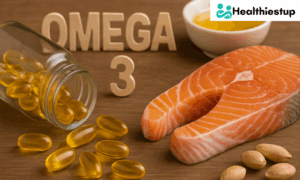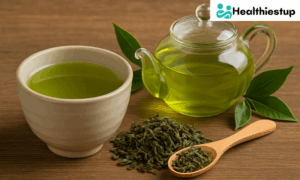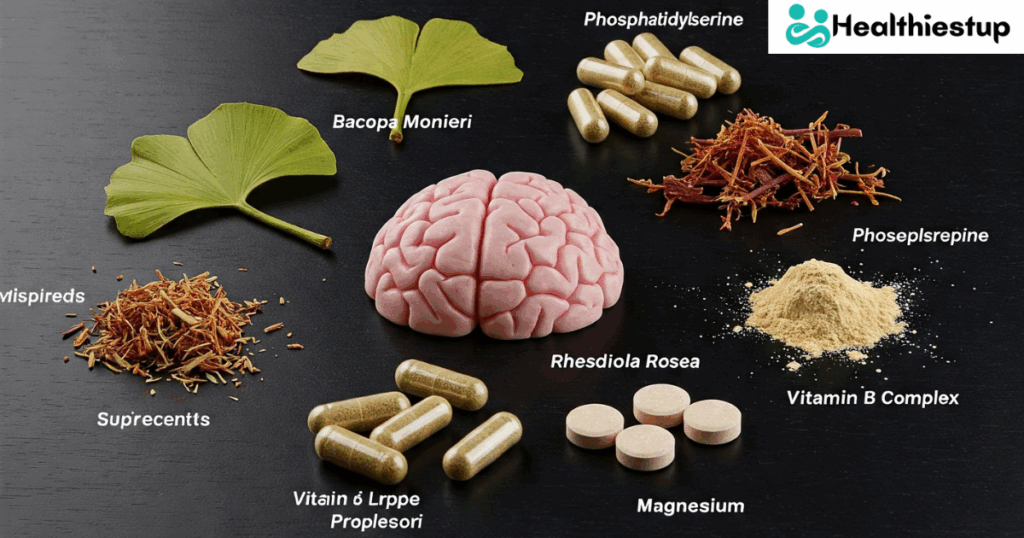Introduction
Brain health supplements: Your brain is the control center of everything you do thinking, remembering, feeling, even breathing. But in today’s fast-paced world filled with stress, poor diet, and lack of sleep, it’s easy for your brain to feel like it’s running on empty. That’s where brain health supplements come into play. These aren’t magic pills, but when chosen wisely and used consistently, they can support cognitive function, enhance memory, reduce mental fatigue, and even protect against age-related decline. Let’s dive deep into the world of brain-boosting supplements and find out what really works and why your brain might thank you for it.
1. Omega-3 Fatty Acids – The Foundation of Brain Health
Brain health supplements: Omega-3 fatty acids, particularly DHA (docosahexaenoic acid), are essential for maintaining brain structure and function. These fatty acids are a key component of cell membranes and are vital for neuron communication.

- Why It Works: DHA plays a major role in the development and function of the central nervous system. It improves fluidity in brain cell membranes, which enhances signaling and reduces inflammation.
-
Sources: Fish oil, krill oil, and algal oil (for vegans).
-
Scientific Backing: Studies show omega-3s can slow cognitive decline, improve memory in older adults, and even support mood stabilization.
Dosage Tip: Aim for at least 250–500 mg of combined EPA and DHA daily for general brain health.
2. Phosphatidylserine – The Memory Molecule
Brain health supplements: Phosphatidylserine is a phospholipid that covers and protects the cells in your brain and carries messages between them. It’s crucial for keeping your mind sharp, especially as you age.
-
Cognitive Benefits: Helps improve memory, attention, language skills, and the ability to solve problems.
-
What the Research Says: Older adults who take 100 mg three times daily have shown improvements in memory and mood. It’s one of the few supplements with FDA-qualified health claims for cognitive dysfunction in aging.
Good to Know: It’s naturally found in small amounts in foods like soybeans and white beans, but supplementing ensures effective dosages.
3. Ginkgo Biloba – The Ancient Brain Tonic
Brain health supplements: Ginkgo biloba is one of the oldest living tree species, and its extract has been used for centuries in traditional medicine. Today, it’s one of the most popular herbal supplements worldwide.
-
How It Works: Ginkgo increases blood flow to the brain, which may improve oxygen delivery and support overall mental performance. It also has antioxidant properties.
-
Great For: Memory enhancement, reducing mental fatigue, and even managing symptoms of anxiety.
-
Scientific Studies: A meta-analysis found that Ginkgo biloba can improve cognitive function in people with dementia and mild cognitive impairment.
Usage Tip: Take 120–240 mg per day, divided into two or three doses, for optimal results.
4. Bacopa Monnieri – The Stress-Fighting Smart Herb
Brain health supplements: Used in Ayurvedic medicine for centuries, Bacopa Monnieri is renowned for enhancing memory, reducing anxiety, and improving brain function.
-
What Makes It Effective: It contains bacosides, compounds believed to help repair damaged neurons and improve nerve impulse transmission.
-
Best For: Students, professionals, or anyone under high mental stress who wants a natural brain boost.
-
Study-Backed Results: In clinical trials, Bacopa has shown improvements in information retention, reaction time, and mental clarity after 12 weeks of use.
Dosage Advice: Look for a standardized extract containing 45–55% bacosides and take 300 mg daily.
5. Lion’s Mane Mushroom – The Brain Regenerator
Brain health supplements: Lion’s Mane is a unique-looking mushroom with powerful nootropic effects. It’s believed to stimulate nerve growth factor (NGF), which plays a key role in neurogenesis the creation of new neurons.
-
Neuroprotective Benefits: Supports brain plasticity, enhances memory, and may help with conditions like mild cognitive impairment and even early Alzheimer’s.
-
Mood Enhancer: Some studies also link it to reduced symptoms of depression and anxiety.
-
Backed by Research: Animal studies show increased NGF levels, while human trials indicate improvements in cognitive scores after just a few weeks.
Take It Right: 500–1000 mg of a high-quality extract taken 1–2 times a day can yield benefits over time.
6. N-Acetyl L-Tyrosine – The Mental Energy Booster
Brain health supplements: N-Acetyl L-Tyrosine (NALT) is a more bioavailable form of the amino acid L-tyrosine. It’s a precursor to dopamine, norepinephrine, and epinephrine—neurotransmitters crucial for mood, motivation, and mental performance.
-
Why It’s Powerful: During stress, your brain burns through these neurotransmitters quickly. NALT replenishes them, helping you stay focused and energized.
-
Top Benefits: Enhances working memory, multitasking, and cognitive flexibility—especially during periods of sleep deprivation or stress.
-
Research-Proven: Clinical trials show that tyrosine can enhance cognitive performance in stressful environments, including cold, noise, and multitasking scenarios.
Daily Dose: 300–500 mg before mentally demanding tasks or stressful events.
7. Rhodiola Rosea – The Natural Adaptogen
Brain health supplements: Rhodiola Rosea is an adaptogen, meaning it helps your body adapt to stress. It’s been used in traditional medicine across Russia and Scandinavia for centuries to fight fatigue and boost resilience.
-
How It Helps the Brain: Reduces cortisol levels (the stress hormone), supports neurotransmitter balance, and improves mental clarity.
-
Perfect For: Burnout, fatigue, and poor focus caused by prolonged stress.
-
Science Speaks: Studies suggest Rhodiola improves attention, decreases fatigue, and enhances mental performance during stressful periods.
Pro Tip: Use 200–400 mg daily, standardized to contain 3% rosavins and 1% salidrosides.
|Also Read: Boost Your Gut: How Probiotics vs Prebiotics Work Naturally
8. Acetyl-L-Carnitine (ALCAR) – The Brain Energizer
Brain health supplements: Acetyl-L-carnitine is a form of L-carnitine that crosses the blood-brain barrier. It’s best known for its role in energy production, but its brain benefits are even more impressive.
-
Cognitive Advantages: Enhances mitochondrial function in brain cells, combats age-related mental decline, and supports mood and focus.
-
Mood Enhancement: Often used for treating depression in older adults due to its neuroprotective and mood-lifting properties.
-
Backed by Data: Research shows ALCAR can improve attention and mental energy, particularly in people with cognitive impairments or fatigue-related conditions.
Effective Dose: 500–1500 mg daily on an empty stomach for best absorption.
9. Creatine – More Than Just Muscle Power
Brain health supplements: While creatine is popular in the fitness world, it’s also a powerful cognitive enhancer. It helps produce ATP, the energy currency of your cells, including brain cells.
-
Mental Edge: Creatine supplementation has been shown to improve short-term memory, reasoning skills, and mental fatigue especially in vegans and vegetarians who may have lower levels.
-
For Whom: Great for students, professionals, and older adults looking to sharpen mental stamina.
-
Science Update: A 2003 study found that 5 grams of creatine daily improved intelligence test scores and memory performance in healthy young adults.
Optimal Intake: 3–5 grams daily. Mix with water and drink consistently for long-term brain benefits.
10. Citicoline (CDP-Choline) – The Memory Multiplier
Brain health supplements: Citicoline is a brain-specific version of choline that not only helps synthesize acetylcholine (a key neurotransmitter) but also supports phospholipid production in brain membranes.
-
What It Does: Boosts memory, mental energy, attention span, and neuroplasticity.
-
Dual Action: Enhances communication between neurons and protects against cognitive decline and brain injuries.
-
Proven in Research: Citicoline has shown promise in stroke recovery, age-related memory loss, and even attention-deficit disorders.
Suggested Use: 250–500 mg twice daily. Look for branded forms like Cognizin® for quality assurance.
11. L-Theanine – Calm Focus Without the Crash
Brain health supplements: L-Theanine is an amino acid most commonly found in green tea. Unlike stimulants, it offers a calm, relaxed alertness `making it a perfect companion to caffeine or a standalone nootropic.

- Why It Works: Increases alpha brain waves associated with creative, relaxed thinking. It also balances neurotransmitters like serotonin and dopamine.
-
Best Use Cases: Ideal for improving focus during work or study without jitteriness or burnout.
-
Studies Show: When combined with caffeine, L-theanine improves reaction time, attention, and working memory significantly more than caffeine alone.
How to Take It: 100–200 mg, optionally with a small dose of caffeine (around 50 mg) for synergistic effects.
12. Vitamin B Complex – The Brain’s Metabolic Support Team
Brain health supplements: B vitamins (especially B6, B9, and B12) are essential for producing energy, synthesizing neurotransmitters, and preventing brain shrinkage.
-
Why They’re Vital: Low levels of B vitamins have been linked to brain fog, fatigue, depression, and even increased risk of dementia.
-
The Evidence: Research shows that supplementation with B-complex vitamins slows brain atrophy and supports mood and mental performance.
-
Who’s at Risk: Vegans, vegetarians, and older adults are more likely to have B-vitamin deficiencies.
Dosage: Look for a high-quality B-complex with methylated forms of B12 (methylcobalamin) and folate (L-5-MTHF) for better absorption.
13. Curcumin – The Anti-Inflammatory Brain Defender
Brain health supplements: Curcumin is the active compound in turmeric, known for its potent antioxidant and anti-inflammatory effects.
-
Brain Benefits: Protects against neurodegeneration, improves mood, and enhances memory through increased BDNF (brain-derived neurotrophic factor).
-
Clinical Findings: A 2018 study showed that daily curcumin improved memory and attention in non-demented adults.
-
Absorption Note: Curcumin on its own is poorly absorbed, but pairing it with black pepper extract (piperine) can boost bioavailability by up to 2000%.
Effective Form: Choose a bioavailable form like Meriva®, Longvida®, or BCM-95®. Aim for 500–1000 mg daily.
14. Resveratrol – The Brain-Protecting Antioxidant
Brain health supplements: Resveratrol is found in the skin of red grapes and is often credited for the “French Paradox”—the idea that red wine contributes to better heart and brain health.
-
How It Supports the Brain: Crosses the blood-brain barrier to reduce inflammation, improve blood flow, and enhance memory function.
-
Aging Brain Benefits: May help prevent plaque formation and oxidative damage linked to Alzheimer’s and other neurodegenerative diseases.
-
Latest Research: Studies have shown resveratrol supplementation boosts hippocampal function—the area of the brain involved in learning and memory.
Dosage: 150–500 mg per day. Combine with quercetin or curcumin for enhanced effects.
15. Magnesium – The Mood and Memory Mineral
Brain health supplements: Magnesium is involved in over 600 enzymatic reactions in the body, including many that influence brain health. It’s essential for managing stress and optimizing sleep—both crucial for mental clarity.
-
Why It Matters: Magnesium regulates NMDA receptors, which play a key role in synaptic plasticity (learning and memory).
-
Common Deficiency: Many people have low magnesium levels due to diet, stress, and poor absorption.
-
Science Backs It Up: Magnesium L-threonate, a form that penetrates the brain, has shown potential to reverse memory decline and improve synaptic density.
Smart Pick: Take 150–250 mg of magnesium L-threonate or glycinate for best brain benefits.
Conclusion
Brain health supplements: Keeping your brain healthy and sharp is a long-term investment. While brain health supplements alone won’t transform your mind overnight, they can be powerful tools when combined with a healthy diet, regular exercise, quality sleep, and stress management. From omega-3s to Lion’s Mane, Bacopa to Magnesium, there are dozens of natural compounds that can protect your brain, enhance cognitive function, and give you the mental edge you’re looking for.
The key is consistency, smart stacking (using complementary supplements together), and choosing high-quality, bioavailable forms. Remember, your brain does a million things every day—give it the fuel it deserves.
FAQs
Q1. What is the best supplement for overall brain health?
Omega-3 fatty acids (especially DHA) and Citicoline are among the most researched and effective for overall cognitive support.
Q2. Can I take multiple brain health supplements at once?
Yes, many brain health supplements work synergistically. For example, L-Theanine and caffeine pair well, as do Curcumin and Piperine. Always consult a healthcare provider before combining several.
Q3. How long before I notice results from brain health supplements?
Some, like caffeine and L-theanine, work within hours. Others, like Lion’s Mane or Bacopa Monnieri, may take weeks of consistent use to show effects.
Q4. Are there any side effects to brain health supplements?
Most are safe when taken at recommended dosages. Mild side effects can include stomach upset, headaches, or sleep disturbances in sensitive individuals.
Q5. Can brain health supplements prevent Alzheimer’s or dementia?
While no supplement can cure or definitively prevent these conditions, many (like curcumin, omega-3s, and resveratrol) show promise in reducing risk and supporting long-term brain health.



